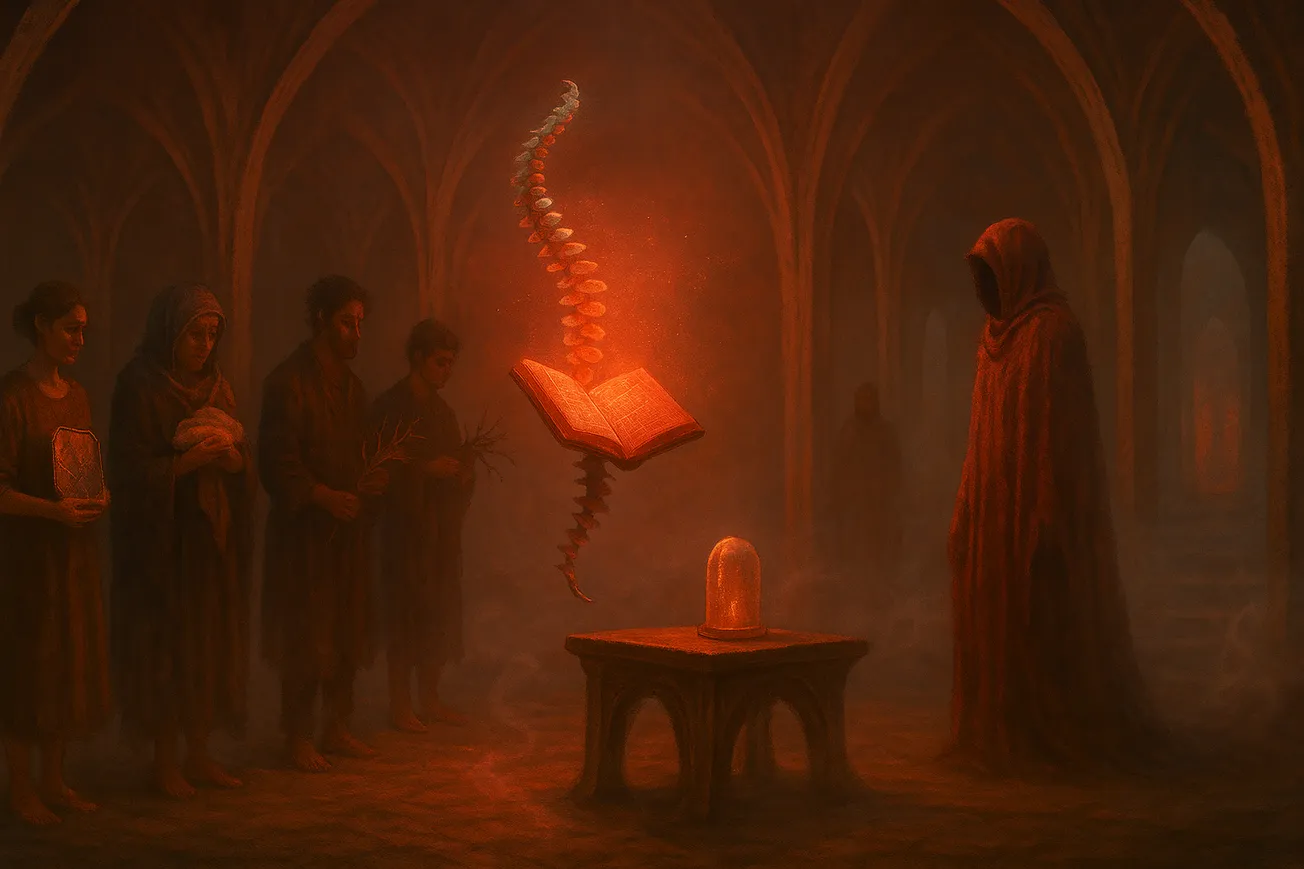🌈 The Fractal Story Engine | Body & Death | (12) BD-001-S
Each dawn, the Archivist opened the crimson book.
Not with hands, for she had none, but with the will of her spine. A long column of etched vertebrae hummed with memory. The book opened itself, pages unfolding like petals, and the pain of the world began to murmur.
The village knew the ritual. Before the third bell, the line would form, barefoot and wordless. No one spoke in the presence of pain.
Each came with an offering, a wound to be recorded and relinquished. A mother brought her sleepless grief, bundled like a child in muslin. A fisherman offered the ache that lived in his wrists from pulling nets long after the storms had stolen his brothers. A girl with no visible injury laid down the shame that curled behind her ears whenever she smiled.
The Archivist absorbed them all.
Pain, once offered, did not vanish. It transmuted. The Archivist took it into her body, layer upon layer of unseen bruises, memories that prickled like needles under skin that never tore. Her face remained serene, as if carved from the pale bark of a ghost tree, but her eyes flickered with storms. Each injury became a glyph. Each burden, a scar of meaning. She did not weep. She stored.
No one knew what became of the pain once written. Only that it no longer belonged to them.
One morning, when the bells rang wrong, a hollow, dragging tone like grief yawning wide, a stranger stood at the edge of the line. Wrapped in a robe the color of old wounds, he carried nothing. No limp. No tears. No scabs or fever-glow.
But the moment he stepped forward, the wind recoiled.
The Archivist stilled.
He bowed, and when he looked up, the line behind him vanished.
“I have brought a pain with no source,” he said. “It was born before my birth and has followed me through lives.”
The Archivist nodded once.
He stepped forward and placed a single silver hair onto the book.
It did not curl. It did not shift. But the book shuddered.
A sound bloomed from within it, not a scream, but the echo of a scream too vast to be held by a single voice.
The Archivist’s body cracked, ever so slightly.
“I ask,” said the stranger, “to give this pain to you.”
A pause.
Then the Archivist did something she had never done.
She closed the book.
The red pages folded in like a wound sealing. The spine creaked.
“No,” she whispered.
Not aloud. Her voice moved through the marrow of those still listening.
The stranger did not argue. He only smiled, as if he had been waiting for refusal.
Then he stepped into the sea.
The sea had no water. Only memory.
He sank like a thought that refused to die.
Later that evening, the villagers returned. The line reformed. A child with a toothache. A widow holding yesterday.
But the Archivist sat still beside the closed book.
That night, for the first time, she dreamed.
She saw a world where pain wandered free, with no archivists to catch it.
A world where each bruise was worn openly and stories bloomed like flowers from wounds.
In the morning, she opened the book again.
But this time, she did not absorb.
She gave.
Each person left not lighter, but truer.
Their pain, no longer stored, became compost.
From it grew new things.
A boy sang with a voice that trembled.
A woman danced, limping and radiant.
A tree split its bark wide to reveal fruit shaped like old scars.
And somewhere beneath the sea, the stranger wept.
Not from pain.
But from recognition.

